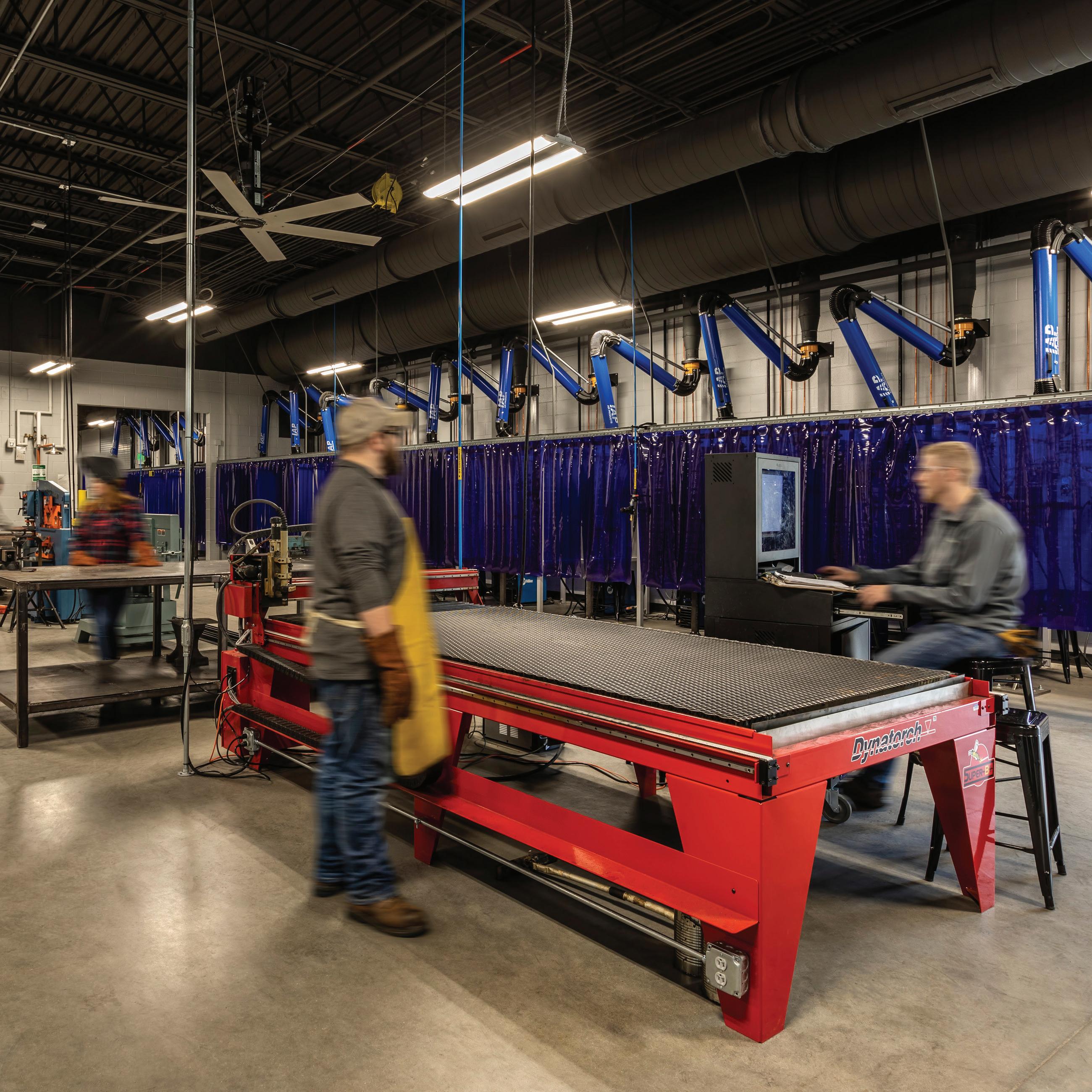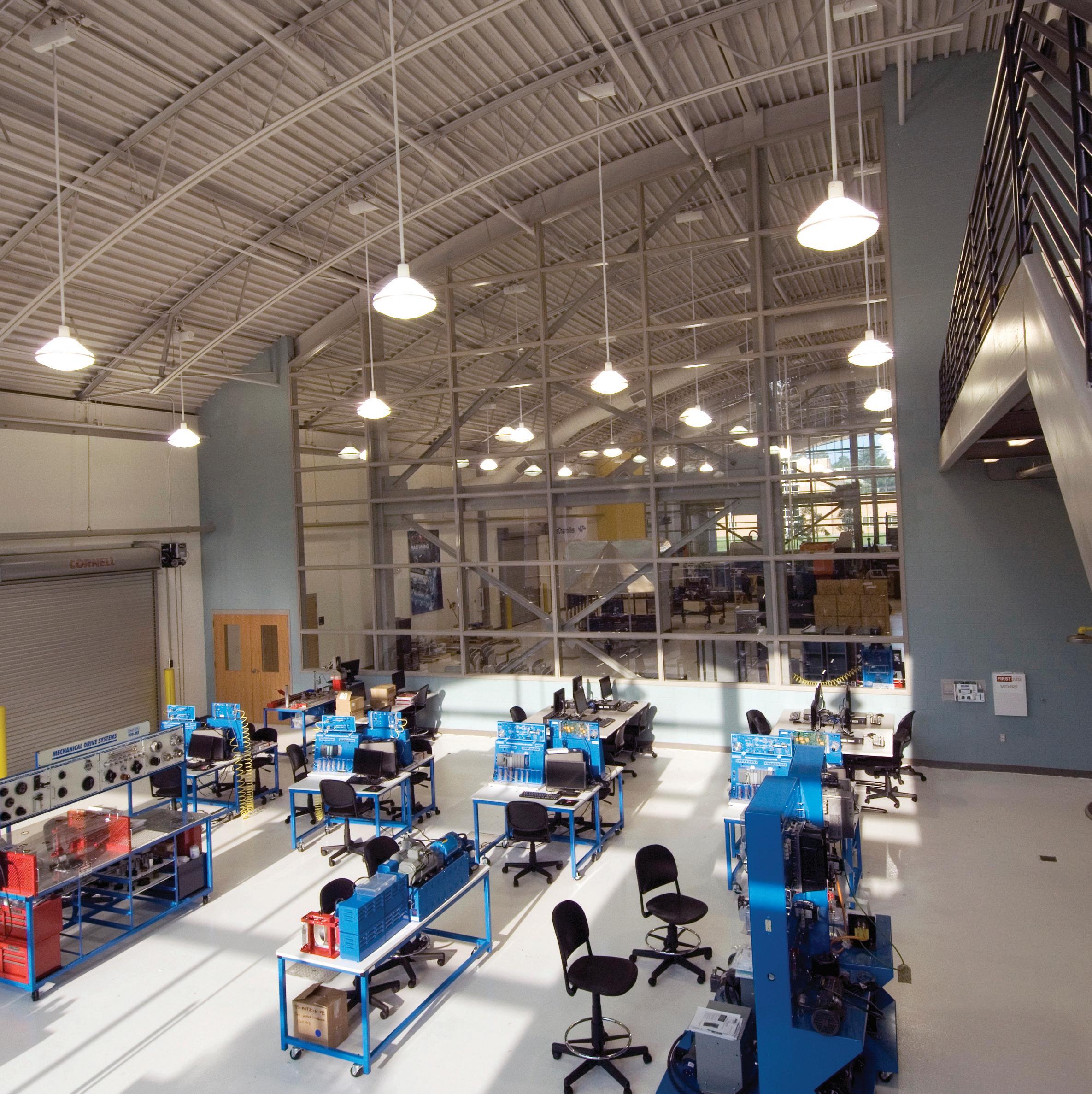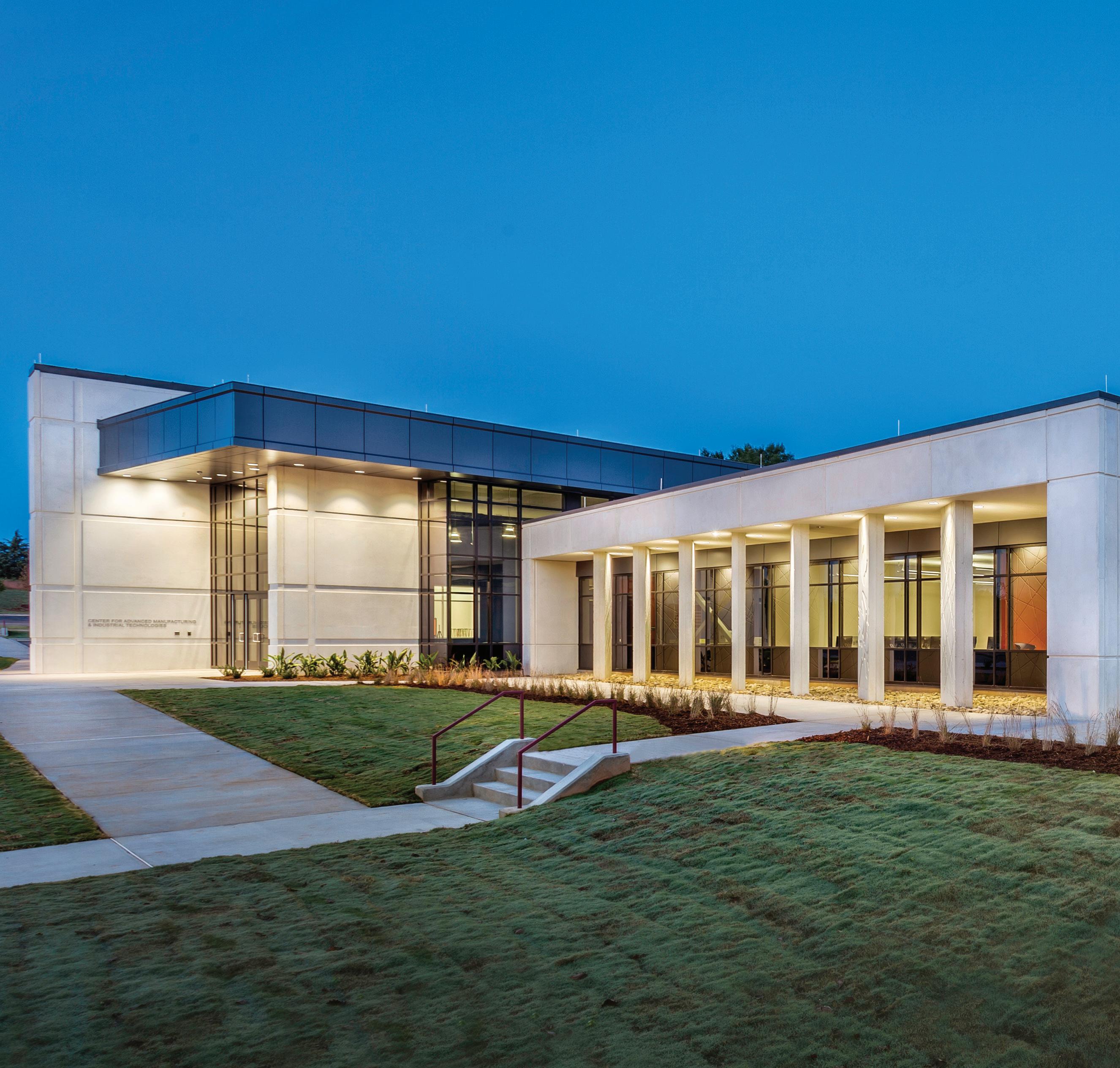

We are proud to have designed and delivered projects for over 120 higher education clients across the Southeast, including over 50 community colleges .



We are proud to have designed and delivered projects for over 120 higher education clients across the Southeast, including over 50 community colleges .
Established in 1963, LS3P is a multidisciplinary firm offering architecture, interiors, and planning services to a wide variety of clients nationwide. Central to all regions of the Southeast with offices in Charleston, Columbia, Greenville, Myrtle Beach, Asheville, Charlotte, Greensboro, Raleigh, Wilmington, Atlanta, Savannah, and Jacksonville, LS3P is committed to bringing state-of-the-art design, technology, and expertise of a strong regional firm closer to our clients on a local level. With a staff of over 500 employees, we have the resources to offer total design capabilities from site selection to occupancy, yet we are small enough to give personal attention to each client.
We are well-versed in the challenges which are particular to campus design including working with academic calendars, navigating funding mechanisms, and designing for both immediate needs and long-term flexibility.
The editor of DesignIntelligence has called LS3P “the most local of the global firms and the most ‘world-class’ of the locals.” LS3P brings a history of over 61 years of design excellence, with over 680 design awards across diverse practice areas. With a mission to “engage, design, and transform,” we are deeply committed to the communities we serve. We believe in collaboration, innovation, and building lasting relationships with our clients. With an extensive portfolio of Higher Education projects, LS3P provides campus design solutions which meet today’s needs with flexibility for the future.


In a rapidly changing economy, one truth unites people across the country: more jobs - and better jobs - are a good thing for everyone. When companies bring new jobs to an area, this job growth not only benefits employees, but also creates a ripple effect that extends to their families, their communities, their cities, and their regions.
With increasing desire for onshoring in a global market, much of this job growth in recent years has been in the advanced manufacturing sector. Cities across our region are investing in substantial automotive and aerospace clusters, with easy access to port, rail, and other transit options. Other areas serve as hubs for growing commercial and tech markets, further propelling our region’s growth.
Growth attracts investment, and investment generates jobs.
The newest wave of growth in the industrial sector brings not just jobs, but highly desirable jobs. Today’s manufacturing processes bear little resemblance to those of our era’s past. Advanced manufacturing is cleaner, safer, and faster than ever before, with a more consistent quality of product. The tools are infinitely more intricate and interconnected, and their operation and maintenance require a high-level skill set commensurate with their technological complexity.
Thanks to continued investment in workforce development programs and advanced manufacturing training facilities by community and technical colleges, as well as industry partners across the region, a highly-skilled workforce has formed to support this economic growth while providing an excellent return on investment for communities.




LS3P is proud to have been at the forefront of developing best practices for these designs in collaboration with a number of our community college, technical college, and university partners.
Above all, these facilities must be designed for flexibility to accommodate open, durable, multifunctional spaces to allow educational/training facilities to keep up with changes in industry trends, ongoing technological advancements, and equipment updates. In many cases, these training spaces are also transparent, putting the learning and technology on display to highlight a new paradigm of advanced manufacturing and the opportunities it provides.
Our nation’s community and technical colleges have been instrumental in addressing these questions for decades. The community college model consistently excels at helping workers respond to economic opportunities by anticipating where the needs are and creating curricula to re-train workers accordingly. It is a nimble system that responds rapidly to opportunity.
Industry partnerships with community and technical colleges are reciprocal. Manufacturers help set curricula tailored to specific training needs, including certifications and re-certifications. This allows colleges to benefit from increased enrollment, and in many cases, donated or leased state of the art machinery.
Preparing individuals for careers in rapidly changing advanced industries is going to require radically different approaches to education and skills training, whether it be new approaches to competency-based certificate programs, short-term ‘bootcamp,’ or entirely new online solutions.
Across the Southeast, communities are recognizing the economic potential within the advanced manufacturing industry and are searching for ways to invest in training programs. Funding mechanisms vary, but many of these programs are created in collaboration with State entities such as South Carolina’s readySC, North Carolina’s Golden Leaf Foundation, and Georgia’s Quick Start, and are designed to connect manufacturers with specific skill training programs. Others are funded in part by grants and loans from the U.S. Economic Development Association and other federal agencies.



Despite significant recent disruptions to the global economy, the number of U.S. manufacturing employees has been growing steadily since 2010, with a commensurate growth in production. Modern trends in technology and manufacturing bode well for continuing growth in the industrial sector, particularly in the Southeast. The region outpaces many other areas in terms of attracting both companies and skilled labor; availability of land, coupled with a high quality of living and easy access to port, rail, and aviation hubs, make it a desirable place to do business. These trends point to the increasing demand for a highly skilled workforce and the continued need for investment in advanced manufacturing training programs and facilities to support this pipeline of talent.

Manufacturing companies seeing tighter control over their supply chains and facilities will likely accelerate the existing trend towards onshoring and re-shoring of American manufacturing jobs. This trend will boost demand for a skilled pipeline of US manufacturing employees.

The biotech, laboratory, research, and biomedical markets are likely to increase as well. Life Sciences facilities are seeing growing demand along with the need to develop, produce, and distribute both vaccines and therapies on a large scale.

Robotics, cobotics, and augmented reality will increasingly allow for highly skilled workers to use precision mechatronics tools to blend the best of critical thinking and automation. The Internet of Things will continue to drive advances in smart technologies and logic controlled autonomic manufacturing.

Companies frequently use rapid prototyping techniques such as stereolithography, selective laser sintering, or sheet lamination to create high-fidelity prototypes in the process of testing new design solutions. Space and infrastructure to support this highly specialized equipment must be tailored to accommodate these processes.

Due to increasing demand uncertainty and product variety, manufacturing systems must continually adapt to maintain productivity. Educational facilities must be flexible enough to accommodate new programs, new equipment, and new teaching methodologies.
Look for these symbols on the following pages to see what trends are used throughout LS3P’s portfolio.

A first of its kind partnership between Greenville Technical College and with Clemson University’s International Center for Automotive Research in the U.S., the CMI bridges the gap between engineers and technicians by integrating them into a single, specialized training environment.
GREENVILLE, SC


106,000 GSF // New Construction
PROGRAMS SERVED
Automation
Machining
Manufacturing Technology
Mechatronics
Metrology
Robotics
Rapid Prototyping
Start-Up Incubator Space
In-Line Compounding Plant
Learning Commons
High-Bay Space
Research and Innovation Labs
Showroom
University and Industry Partnership





44,000 GSF // New Construction
CNC/CMM/Manual Milling
Mechatronics
Welding PROGRAMS SERVED
Flexible Labs for Industry Partnerships
Graphics & Wayfinding
Daylighting
2 Green Globes
Partnership with ReadySC






Advanced Industrial Technology
Chemical and Materials Engineering
Machining PROGRAMS SERVED
Industry Partnerships
High-Bay Space
Multipurpose Labs


For South Carolina to have the ability to absorb the workforce requirements of suppliers as well as Boeing, we need added capacity to train workers. This new facility will position our state to meet the needs of the rapidly expanding aerospace cluster as well as other advanced manufacturing industries.”
DR. MARY THORNLEY // FORMER PRESIDENT TRIDENT TECHNICAL COLLEGE


164,000 GSF // New Construction
Aircraft Assembly & Maintenance
Avionics
Computer Numerical Control
Composite Manufacturing Technology
Electrical Automation & Controls
Mechatronics
Machining
Aircraft Ramp
Boeing 787 Barrel Section
High-Bay Hangers
Flight Simulation
Paint Booth (Aviation)
Specialty Labs
Industry Partnerships
Workforce Development





103,000 GSF // Adaptive Reuse SUMTER,
PROGRAMS SERVED
Automotive Technology
Computer Science
Manufacturing Simulated Work Environment
Mechatronics
“Big Box Store” Adaptive Reuse
Lobby Showcasing Tech Programs
Intake Training/Evaluation Center
Two Green Globes



A key element of the 250-acre CU-ICAR campus, the Center for Emerging Technologies’ design fosters innovation between students, faculty, and 12 campus partners across transportation, technology, and energy industries.
CLEMSON UNIVERSITY INTERNATIONAL CENTER FOR AUTOMOTIVE RESEARCH
GREENVILLE, SC


60,000 GSF // New Construction
PROGRAMS SERVED
Automotive Engineering
Manufacturing
UNIQUE FEATURES
High-Bay Research Labs
Flexible Building Systems
Reconfigurable Labs
Technology Cafe
LEED Silver





29,000 GSF // New Construction
Machining
Manufacturing Technology
Mechatronics PROGRAMS SERVED
Observation and Tour Balcony
Career Exploration Center
CIM Labs
Corporate Training Center
High-Bay Labs




24,668 GSF // New Construction
Advanced Welding Technologies
Commercial Refrigeration and Air Conditioning
Diesel Engine Technology
Machine Tool Operations
Machine Tool Technology
Mechatronics Technology
Outboard Marine Technology
Residential/Commercial Electrical Technician
Residential HVAC Service Technician
Industry Partnerships

Associate Architect: SGA



27,500 GSF // New Construction GAFFNEY, SC
PROGRAMS SERVED
Automation and Electronics
Automated Manufacturing Technology
Automotive Technology
Gas and Energy Technology
HVAC (Heating, Ventilation, Air-Conditioning)
Industrial Electricity
Industrial Electronics Technology
Industrial & Trade
Machining Technology - CNC
Manufacturing Operations
Mechatronics
Process Control Technology
Production Associate
Welding





75,450 GSF // Adaptive Reuse NEWBERRY,
PROGRAMS SERVED
Automation
Electrical Technology
Industrial Arts
Mechatronics
“Big Box Store” Adaptive Reuse
Collaborative Learning
Community Conference Center
LEED Certified



I-95/I-40


60,000 GSF // New Construction FOUR OAKS, NC
PROGRAMS SERVED
Applied Engineering
CNC
Gunsmithing
Machining
Manufacturing Technology
Mechatronics
Metal Fabrication
Robotics
Welding
UNIQUE FEATURES
Collaboration with Johnston Community College
Future Flexible Lab Spaces
High-Bay Labs
Incubator Space
Industry Partnerships




Aiken Technical College
Graniteville, SC
• CEAM Welding Expansion Study
• Manufacturing Technology Center
Blue Ridge Community College
Flat Rock, NC
• Spearman Building Addition
Cape Fear Community College
Wilmington, NC
• Applied Technologies Building
Central Carolina Technical College
Sumter, SC
• Advanced Manufacturing Technology Training Center
Clemson University International Center for Automotive Research (CU-ICAR)
Greenville, SC
• Campus Master Plan
• AutoPark and Management Partner Offices
• Center for Emerging Technologies
• One Research Drive
Clemson University Restoration Institute (CURI) Charleston, SC
• Zucker Family Graduate Education Center
Craven Community College
New Bern, NC
• Bosch & Siemens Advanced Manufacturing Facility
Florence-Darlington Technical College
Florence, SC
• SiMT Manufacturing Incubator Center
Greenville Technical College
Greenville, SC
• Center for Manufacturing Innovation
• Michelin Training Center
Horry-Georgetown Technical College
Myrtle Beach, SC
• Advanced Manufacturing Center
I-95/I-40 Crossroads of America
Alliance/ Johnston Community College
Four Oaks, NC
• Advanced Manufacturing Training Center
Isothermal Community College
Spindale and Columbus, NC
• Applied Sciences and Workforce Development Center
• Technical Training Building
Ogeechee Technical College
Statesboro, GA
• Industrial Robotics Training Center
Orangeburg Calhoun Technical College
Orangeburg, SC
• Advanced Manufacturing Industrial Master Plan
Piedmont Technical College
Greenwood and Newberry, SC
• Newberry County Center
• Upstate Center for Advanced Manufacturing Excellence
Southern Regional Technical College
Moultrie, GA
• Technical & Industrial Education Building
Spartanburg Community College
Gaffney, SC
• Cherokee Advanced Technology Center
Tri-County Technical College
Pendleton, SC
• Cleveland Hall Mechatronics Renovation
• Industrial Technology Center
Trident Technical College
North Charleston, SC
• SC Aeronautical Training Center
Wake Technical Community College
Raleigh, NC
• Skilled Trades Building


SHAWN SOWERS AIA, LEED AP BD+C
Higher Ed Practice Leader

BRIAN TIEDE AIA, LEED AP
RDU Higher Ed Sector Leader
WILL HINKLEY
Advanced Manufacturing Specialist

KYLE KISER A IA
GSP Higher Ed Sector Leader

